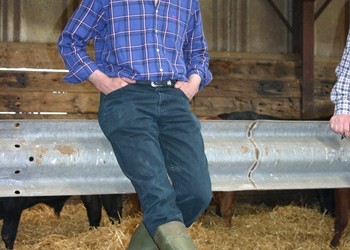THE recent Moray and Nairn Monitor Farm meeting was unusual, in that it was a two-day event which gave the community group the opportunity to view finished beef bulls the day before slaughter and the carcases post-slaughter.
Cluny Farm, near Forres in Morayshire, is farmed by Robbie Newlands with his wife, Kirsty, and his father, also Robbie. The farm is part of the network of Monitor Farms, led by Quality Meat Scotland (QMS).
The Newlands’ 170 plus suckler cow herd is mainly British Blue cross Holstein. All bull calves are kept entire and, other than heifer’s calves, all progeny are Charolais-sired.
Spring-born, the bull calves are housed in straw yards at weaning, with the first ‘draw’ taken the following May. They are sold on a deadweight basis to Anglo Beef Processors (ABP) at Perth.
Beef from beef-bred suckler bulls can be labelled Scotch providing the animal is under 16 months-old and where customer specification allows. The bulls must also fulfil standard ‘Scotch’ label requirements, i.e. have been born and reared for their entire lives on a QMS Assured farm or farms, and slaughtered in a QMS-assured abattoir.
On the first of the two day ‘meeting’, ABP buyer Brian Webster, along with Robbie Newlands, selected ten finished bulls – eight Charolais-sired and two Limousin-sired.
Two days later, the Newlands, along with members of the Monitor Farm community group, travelled to Perth to view the carcases and hear a beef market update from ABP Perth general manager, Frank Ross, himself a Morayshire farmer’s son.
The ten Newlands bulls ranged in age from 13.1 months to 14.7 months. Half of them graded U for conformation, with the other half R. All but one graded either 3 or 4L for fat classification. Net deadweight ranged from 354.7 kgs to 410.2 kgs, averaging 389.8 kgs.
“You can learn a lot from seeing your own cattle hanging up,” commented Robbie Newlands.
“Initially, I was disappointed when after selecting the bulls at home, I looked at one again a few hours later, and really wondered if we should have kept him longer – he looked as if he could have been taken to a bigger weight.”
This particular bull was the youngest in the load and killed out the lightest. He was, however, also the fattest – grading R4H.
“Once I had seen the carcase, along with the fat classification it became clear that had we kept this bull longer, he may have converted his feed more into fat than lean meat,” remarked Mr Newlands.
“This would have resulted in a cost, instead of an improvement in yield.”
The current weekly throughput at ABP Perth is around 1,400 to 1,450 cattle. Echoing many of his meat processor colleagues, Mr Ross aired his concerns regarding the future availability of finished cattle in Scotland.
QMS figures show that between December 2000 and December 2011, beef cow numbers in Scotland fell by over eight per cent to a total of 460,107.
On the plus side in terms of cattle number throughput, BCMS figures for 2011 reveal that 42,081 dairy bull calves were registered in Scotland, an increase of over 5,000 compared to 2008.
A large percentage of the weekly throughput from ABP Perth goes to supply Asda and Sainsbury’s as Scotch Beef. Makro are also supplied, plus a number of catering and food service companies.
Since the beef export market re-opened in May 2006, ABP Perth has redeveloped a range of overseas markets and is currently exporting to eight countries, mainly in Europe, and more recently into the Far East and Africa.
“A rise in value of the fifth quarter over the last year or two, has yielded a much needed benefit,” explained Mr Ross.
“The market in Europe continues to be strong for a lot of the fifth quarter products, especially in winter months, but there is now a growing market in the Far East and Africa for certain products.
“Some of the products we’re now packing to sell, we used to pay to dispose of, so this has obviously helped.”
QMS chair, Jim McLaren, who joined the group for the abattoir visit, reminded the farmers that consideration and awareness of their market and consumers needs to extend far beyond the back door of the livestock lorry, as it closes behind their animals.
The next Moray and Nairn Monitor Farm meeting will be an Open Evening, on 18th July 2012.
For further information, please contact either of the joint facilitators:
Peter Cook tel 01467 623222 or 07774 160246 or email: cooknewton@btopenworld.com
or Colin Anderson tel 07500 012883 or email: colinanderson2@sky.com
For general information on Monitor Farms, plus detailed reports of meetings visit: www.qmscotland.co.uk/monitorfarms
Caption: Robbie Newlands, Moray and Nairn Monitor farmer
MEDIA RELEASE posted by QMS. You too can post media releases (aka press releases) on allmediascotland.com. For more information, email here.
Contact: Doreen Graham
Phone: 0131 472 4046
Email: dgraham@qmscotland.co.uk
Website: http://www.qmscotland.co.uk






